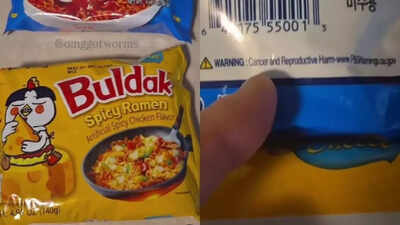A viral video exposing a concerning label on instant ramen noodles has ignited a fierce debate about the potential health risks associated with this popular convenience food. The video, shared widely on social media, highlights a warning label that has left consumers shocked and questioning the safety of their favorite quick meal.

Instant ramen has long been a staple for those seeking a fast, affordable, and satisfying meal. However, this recent controversy has prompted a closer look at the ingredients, additives, and packaging of these noodles.
Ramen's appeal lies in its convenience: a cheap, readily available meal that can be prepared in minutes. But the Instagram video has cast a shadow of doubt on the seemingly harmless snack. The label in question explicitly warns of "Cancer and Reproductive Harm."
This warning is reportedly linked to California's Proposition 65, which mandates that products containing chemicals known to cause cancer or reproductive issues must bear a warning label. The revelation has prompted many ramen enthusiasts to reconsider their consumption habits.
The video's rapid spread triggered a diverse range of reactions across social media platforms. Some users expressed genuine alarm, while others adopted a more cautious approach.
One commenter suggested the danger might not be the noodles themselves but the packaging:
"A lot of times, the packaging itself is toxic. The heat-printed wrappers leach chemicals into your skin at levels above the minimum decided safe exposure amount. That requires them to apply the cancer/hormone disruptor warning.”
Another user cautioned against excessive consumption of spicy foods in general:
“Eating spicy too much every day can increase the risk of cancer. Once in 3–4 months is enough.”
Balancing these concerns, some argued for moderation:
“Nearly everything we eat can do damage if we eat it too much, but every now and then shouldn’t be a problem. I’ve had it a few times, maybe 6 times a year. I would eat it more, but it’s too spicy.”
The United States Department of Agriculture (USDA) provides a detailed nutritional profile of instant ramen. A single 81-gram packet contains:
Furthermore, instant noodles often contain high levels of monosodium glutamate (MSG), a flavor enhancer associated with adverse reactions in some individuals. Healthline reports that symptoms of high MSG consumption can include:
While not everyone experiences these effects, MSG remains a controversial additive within the health and nutrition community.
Newer articles
Older articles
 5 Overlooked Warning Signs of Colon Cancer: Early Detection Saves Lives
5 Overlooked Warning Signs of Colon Cancer: Early Detection Saves Lives
 Shukla's ISS Arrival Heralds New Era for Indian Space Exploration; Gaganyaan Mission Looms
Shukla's ISS Arrival Heralds New Era for Indian Space Exploration; Gaganyaan Mission Looms
 Vijay Sethupathi Apologizes Amid Controversy Over Son Surya's Film 'Phoenix'; Thalapathy Vijay's Support Revealed
Vijay Sethupathi Apologizes Amid Controversy Over Son Surya's Film 'Phoenix'; Thalapathy Vijay's Support Revealed
 Android Security Alert: Government Warns of Critical Flaws Exposing User Data
Android Security Alert: Government Warns of Critical Flaws Exposing User Data
 Ashada Gupt Navratri 2025: Dates, Significance, and How to Observe This Hidden Festival
Ashada Gupt Navratri 2025: Dates, Significance, and How to Observe This Hidden Festival
 Skin Deep: 7 Warning Signs on Your Skin That Could Signal Heart Trouble
Skin Deep: 7 Warning Signs on Your Skin That Could Signal Heart Trouble
 Smith Eyes Grenada Test Return After Injury Layoff
Smith Eyes Grenada Test Return After Injury Layoff
 Staying Hydrated May Significantly Lower Risk of Heart Failure, New Study Suggests
Staying Hydrated May Significantly Lower Risk of Heart Failure, New Study Suggests
 Moto G54 Price Slashed in India: Check Out the New, Lowered Costs
Moto G54 Price Slashed in India: Check Out the New, Lowered Costs
 Gambhir Sidelines Pant's Twin Tons After India's Test Loss, Emphasizes Team Performance
Gambhir Sidelines Pant's Twin Tons After India's Test Loss, Emphasizes Team Performance